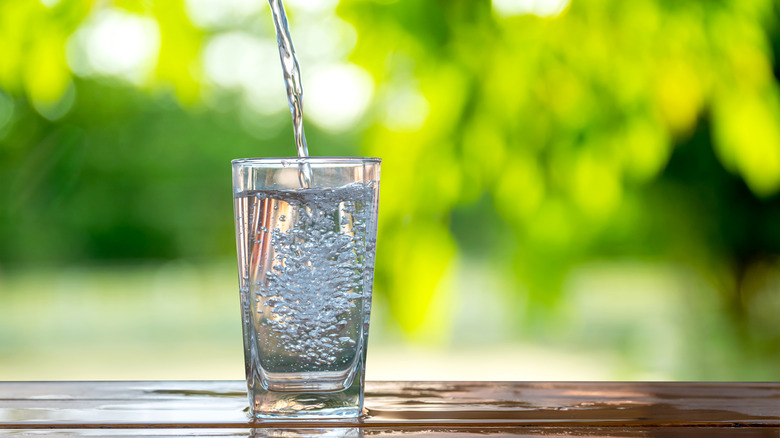Heart Failure Study Gives You Another Reason To Drink More Water
It seems like people these days are always doing their best to stay hydrated, doesn't it? With the rise in sales of reusable water bottles — many of them sleek, attractive, and costing upwards of $45 (via S'Well) — many seem to be on a mission to sip as much water as possible throughout the day. And why not? We're constantly being informed of the benefits of staying hydrated.
According to the National Council on Aging, drinking a sufficient amount of water can result in improved brain performance, better digestive function, reduced joint pain, and increased energy, among a host of additional pluses. The Mayo Clinic advises that men consume almost four liters per day of liquid and women almost three, a figure that luckily includes the water we take in from food and other beverages.
As if we didn't have enough reasons to drink water, a recent study published in the European Heart Journal shows that staying hydrated is essential to heart health, too.
Adequate water intake may reduce the risk of heart failure
The reduced risk of developing heart failure is a benefit that can be added to the list of reasons to stay well hydrated. As reported by ScienceDaily, researchers at the National Institutes of Health found a preclinical connection between dehydration and cardiac fibrosis, which signals the hardening of the muscles of the heart. Focusing in on that data, the researchers looked at the levels of serum sodium in nearly 12,000 adults without preexisting health issues over a timespan of 25 years. They chose to look at serum sodium because those levels reliably increase as the body's fluid level decreases, giving the researchers a good idea of which participants were well hydrated and which weren't.
The researchers found that middle-aged participants with serum sodium levels above the normal range of 135-146 milliequivalents per liter (mEq/L) were at an increased risk of developing left ventricular hypertrophy and heart failure later in life — meaning that it's a good idea to stay hydrated through the intake of water and other fluids. "Serum sodium and fluid intake can easily be assessed in clinical exams and help doctors identify patients who may benefit from learning about ways to stay hydrated," Manfred Boehm, M.D., of the Laboratory of Cardiovascular Regenerative Medicine, told ScienceDaily.
The study's authors recommended a daily fluid intake of 6 to 8 cups for women and 8 to 12 cups for men. So grab that swaggy water bottle and fill it to the brim.

